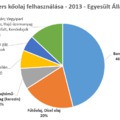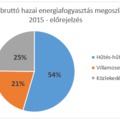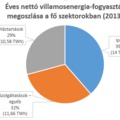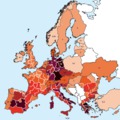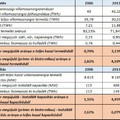In the past years clear scientific consensus emerged that without action on climate change, the world is likely to reach 2°C warming as early as 2040, and a 4°C degree warming by the end of the century (1)(2), threatening to roll back decades of development progress.
But how this all affects Hungary, and what can such a small country do to contribute solving the problem?
Located in moderate continental climate, Hungary is currently less exposed directly to extreme weather events, but globally warmer and more volatile weather affects us and importantly they challenge the agricultural sector.
The supply of essential foods (crops, vegetables, fruits, meat) is not yet threatened, however a +2 or +4 degree warming may challenge the security of basic food supplies. We are also likely to notice significant price increase for food imported from tropical areas (such as coffee or chocolate) that are more exposed the short-term negative impacts of climate change. Since mitigation of weather related effects is very difficult on a country level, solving the root cause requires global action. Therefore it is imperative for Hungary to take part in the economic transition triggered by climate change, and adopt to a more sustainable energy mix.
As a member state of European Union, Hungary also undertook required pledges and set targets for renewable energy usage, aiming to reach 14,65% of overall ratio of renewable energy usage until 2020, with the following specification:
- heating and cooling (for buildings) - 18,9%
- electricity - 10,9%
- transportation - 10%
It is important to understand the distribution of energy usage among different sectors to be able to set the focus areas to work on:
Total domestic energy consumption in Hungary in 2015 is expected to be 849 PJ (i.e. 20 288 ktoe) energy (3)
More than half of the total energy consumption is used for heating and cooling buildings, while the remaining 46% is split between electricity generation and transportation. In the next paragraphs I zoom on these sectors, and draw up potential ways to develop:
1) Heating and cooling
The current ratio of using renewables for heating and cooling buildings is under 10%, and there is a limited potential of massively utilising renewable sources for heat generation (available options are biomass, solar thermal and geothermal).
Therefore the real gain lies in implementing higher environmental quality standards for new buildings to increase energy efficiency as well as modernising old buildings . This brings benefits twofolds: cutting emission, and smaller costs for tenants and building owners for heating and cooling of buildings.
Related to this initiative, a new legislation has passed this May to pledge for 18% overall energy consumption cut until 2020, focusing on building efficiency by introducing higher energy efficiency standards.
2) Electricity generation
Hungary increased the shares of renewables in electricity consumptions from 2006 to 2013 from 2.82% to 4.59%, see on the table below:
Energy production in Hungary (4)
However, new wind power plants were not commissioned to build since 2010, and recently the government imposed an extra tax on solar panels with a widely criticised move. In the meantime, the overhaul and expansion of a nuclear power plant has started. (Unfortunately withholding any economic impact analysis from public debate regarding this investment.)
Nevertheless, the new nuclear power plant is expected to keep providing at least 50% of the country's electricity needs in the next 30 years, which may also lead to gradual phasing out of coal and gas fuelled power plants, in case renewable energy production gets more prominent.
For this to happen, it is essential not to hinder the market penetration of solar panels, since in the coming years levelised cost of energy production with solar panels is catching up with the costs of using fossil fuels. Additionally, the electricity grid also has to be prepared for the transition since a system with more rooftop solar panel implies for a more decentralised grid, which challenges the current status quo.
In the meantime, implementing additional carbon taxes seems to be not viable economically: the increased costs would further decrease the economic competitiveness of the country and the region.
3) Transportation
Transportation has less potential for significant gains compared to the sectors above, however stronger support to low-fuel consumptions vehicles and further improving public transportation (together with urban planning) can gradually reduce emissions.
In summary, while Hungary is less exposed to short-term severe effects of global warming, the country needs to contribute to global efforts in order to reduce long term affects causing serious agricultural problems. Transition to cleaner energy usage is essential, and the largest area for improvement lies within energy efficiency measures (particularly heating and cooling of buildings), both supported by top-down policies and general economic buying behaviour. Additionally, renewable energies (rooftop solar) should be supported with proper infrastructure and economic incentives, as well as general public awareness must be raised about global warming to trigger grassroot actions.
Sources:
(1) Intergovernmental Panel on Climate Change (IPCC): Fifth Assessment Report, Climate Change 2013: The Physical Science Basis
(2) World Bank: Turn Down the Heat: Why a 4°C World Must Be Avoided
(3) Hungarian Renewable Energy Utilisation Plan
(4) Hungarian Independent Transmission Operator Company Ltd (MAVIR Zrt.) - Source: Electricity grid mid- and long-term supply side capacity development report 2007 and 2014
